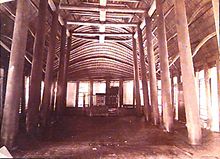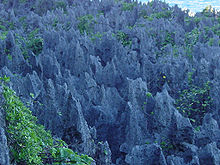Niue

Mormon Church Helped Niue Island History
After a category 5 cyclone devastated the small island nation of Niue in 2004, the records preserved by FamilySearch, the family history organization of The Church of Jesus Christ of Latter-day Saints, become the only existing copies of many of the records. These government records are copied and restored to Niue to help with claims related to property and inheritance. FamilySearch has digitized and preserved billions of records from around the world. You can search for your ancestors at http://www.familysearch.org. You can also volunteer to help make these records searchable and available online by visiting http://indexing.familysearch.org.
Niue (/ˈnjuːeɪ/ new-ay; Niuean: Niuē) is an island country in the South Pacific Ocean, 2,400 kilometres (1,500 mi) northeast of New Zealand and within the triangle formed by Tonga (to the west), Samoa (to the north) and the Cook Islands (to the east). Its land area is 260 square kilometres (100 sq mi) and its population, predominantly Polynesian, is around 1,400. They commonly refer to the island as “the Rock”, a reference to the traditional moniker “Rock of Polynesia.”
Niue is a self-governing state in free association with New Zealand, and most of its diplomatic relations are conducted by New Zealand on Niue’s behalf. All Niueans are New Zealand citizens, and Queen Elizabeth II is Niue’s head of state in her capacity as Queen of New Zealand. 90–95% of Niuean people live in New Zealand, along with about 70% of the speakers of the Niuean language.
Even though Niue is not a member of the United Nations, its status as a freely-associated state has been accepted by UN organs as equivalent to independence for international law purposes. Niue is a member of some UN Specialized Agencies.
In 2003, Niue became the world’s first “Wi-Fi nation”, in which free wireless Internet access is provided throughout the country by The Internet Users Society-Niue.
 Interior of church building in Alofi, 1896.
Interior of church building in Alofi, 1896.
Photo by Thomas Andrew (1855–1939).
Niue was settled by Polynesians from Samoa around 900 AD. Further settlers arrived from Tonga in the 16th century.
Until the beginning of the 18th century, there appears to have been no national government or national leader. Before then, chiefs and heads of families exercised authority over segments of the population. Around 1700 the concept and practice of kingship appear to have been introduced through contact with Samoa or Tonga. From then a succession of patu-iki (kings) ruled the island, the first of whom was Puni-mata. Tui-toga, who reigned from 1875 to 1887, was the first Christian king.
The first European to sight Niue was Captain James Cook in 1774. Cook made three attempts to land on the island but was refused permission to do so by the Polynesian inhabitants. He named the island “Savage Island” because, legend has it, the natives that “greeted” him were painted in what appeared to Cook and his crew to be blood. However, the substance on their teeth was that of the hulahula, a native red banana.
For the next couple of centuries the island was known as Savage Island, until its original name Niuē, which translates as “behold the coconut,” regained use.
The next notable European visitors were from the London Missionary Society who arrived in 1846 on the “Messenger of Peace.” After many years of trying to land a European missionary on Niue, a Niuean named Nukai Peniamina was taken to Samoa and trained as a Pastor at the Malua Theological College. Peniamina returned as a missionary with the help of Toimata Fakafitifonua. He was finally allowed to land in Uluvehi Mutalau after a number of attempts in other villages had failed. The Chiefs of Mutalau village allowed Peniamina to land and assigned over 60 warriors to protect him day and night at the fort in Fupiu.
Christianity was first taught to the Mutalau people before it was spread to all the villages on Niue; originally other major villages opposed the introduction of Christianity and had sought to kill Peniamina. The people from the village of Hakupu, although the last village to receive Christianity, came and asked for a “word of god”; hence their village was renamed “Ha Kupu Atua” meaning “any word of god”, or “Hakupu” for short.
In 1887, King Fata-a-iki, who reigned from 1887 to 1896, offered to cede sovereignty to the British Empire, fearing the consequences of annexation by a less benevolent colonial power. The offer was not accepted until 1900.
Niue was a British protectorate for a time, but the UK’s direct involvement ended in 1901 when New Zealand annexed the island. Self-government was granted by the New Zealand parliament with the 1974 constitution, following a referendum in Niue in 1974 whereby Niueans were given three options: independence, self-government or continuation as a New Zealand territory. The majority selected self-government and Niue’s written constitution was promulgated as supreme law. Robert Rex, ethnically part European, part native, was appointed the country’s first premier, a position he held until his death 18 years later. Rex became the first Niuean to receive a knighthood, in 1984.
In January 2004, Niue was hit by Cyclone Heta, which killed two people and caused extensive damage to the entire island, including wiping out most of the south of the capital, Alofi.



